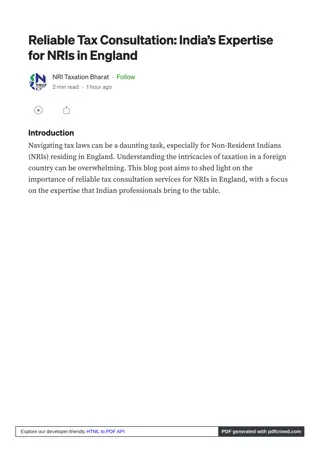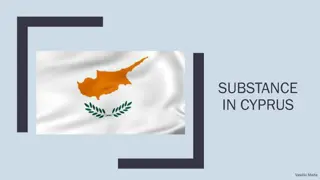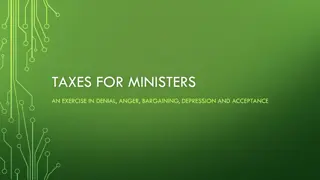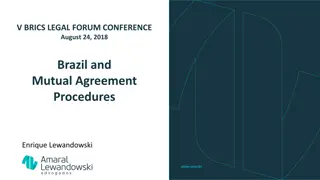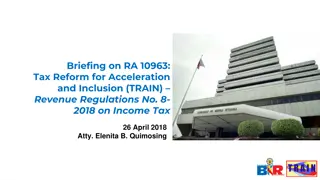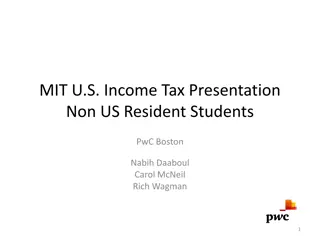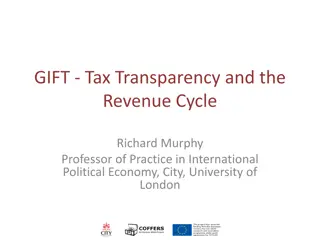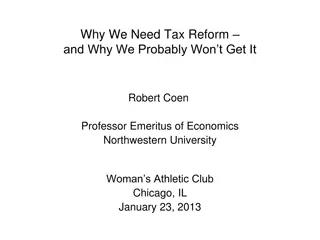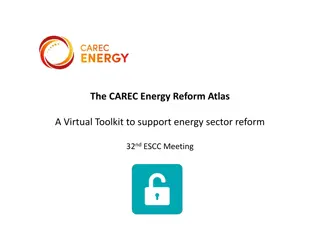Overview of Brazilian Tax Reform Proposal
The Brazilian Tax Reform proposal in October 2019 aims to address challenges in the current tax system by introducing changes such as a broader tax basis, simplification, and centralized collection. The proposal includes various key elements like PEC 45/2019, PEC 110/2019, and PEC 128/2019, aiming for a uniform tax regime and potential taxation on every transaction. However, it also poses challenges such as potential litigation on the definition of destination and the accumulation of IVA credits. The reform seeks to streamline taxation processes and reduce bureaucracy in Brazilian courts.
Download Presentation

Please find below an Image/Link to download the presentation.
The content on the website is provided AS IS for your information and personal use only. It may not be sold, licensed, or shared on other websites without obtaining consent from the author.If you encounter any issues during the download, it is possible that the publisher has removed the file from their server.
You are allowed to download the files provided on this website for personal or commercial use, subject to the condition that they are used lawfully. All files are the property of their respective owners.
The content on the website is provided AS IS for your information and personal use only. It may not be sold, licensed, or shared on other websites without obtaining consent from the author.
E N D
Presentation Transcript
Brazilian Tax Reform October, 2019
Current Brazilian Tax System Revenues Profits Income Import/export Rural property Financial transactions Goods (Some) services Transportation Donations and death Property of vehicles Services Real estate transfer Federal STATE MUNICIPAL Challenges Conflict of competence (states x municipalities) Disputes of interpretation Bureaucracy Litigation in Brazilian courts Brazilian Tax Reform 2
Proposals - Overview PEC 45/2019 PEC 110/2019 PEC 128/2019 IOF COFINS COFINS COFINS PIS PIS PIS CSLL IPI IPI CIDE- Fuel ICMS IPI ICMS IOF ISS ICMS ISS Ed. Salary 6 5 extinctions extinctions ISS 9 extinctions and 2 changes IVA State/ Municipal Federal Selective Tax IVA Federal State IBS Federal IBS IBS Corporate Income Tax IPI IMF Non-cumulative VAT Federal Selective Tax for specific products considered externalities (e.g cigars and alcohol) Non-cumulative StateVAT Federal VAT for specific sectors (e.g., fuel, oil, telecommunication) Corporate Income Tax (CIT+CSLL) Non-cumulative VAT Federal Non-cumulative VAT State/Municipal IMF: Tax over cash flow IPI: only for considered negative externalities negative specific products Two changes: ITCMD to be charged by Federal Government IPVA encompassing aircraft and vessels Taxation on profits and dividends Digital and financial services/goods taxed exclusively by the Federal Government Brazilian Tax Reform 3
General Opportunities and Challenges Opportunities Challenges Broader tax basis: all types of goods, services intangible and other activities will be taxed, imposing taxes in activities which are not currently taxed (such as rental) Tax simplification Uniform tax regime Centralized collection Potential taxation on every transaction Non-cumulative tax (IBS or IVA): all credits Potential litigation on definition of destination Simpler tax reporting Potential accumulation or distortion of IVA credits depending on the companies activity Relief of tax litigation Lack of special regime to given sectors Brazilian Tax Reform 4
www.mattosfilho.com.br www.mattosfilho.com.br S O PAULO PAULISTA Al. Joaquim Eug nio de Lima 447 01403 001 S o Paulo SP Brasil T 55 11 3147 7600 S O PAULO FARIA LIMA Av. Brg. Faria Lima 4100 6 andar 04538 132 S o Paulo SP Brasil T 55 11 3035 4050 BRAS LIA SHS Q6 Bloco C Cj. A sala 1901 70322 915 Bras lia DF Brasil T 55 61 3218 6000 NEW YORK 34 East 51st Street, 12th floor New York, NY 10022 U.S.A. LONDON 5th floor, 32 Cornhill London UK EC3V 3SG T 44 (0)20 7280 0160 RIO DE JANEIRO Praia do Flamengo 200 11 andar 22210 901 Rio de Janeiro RJ Brasil T 55 21 3231 8200
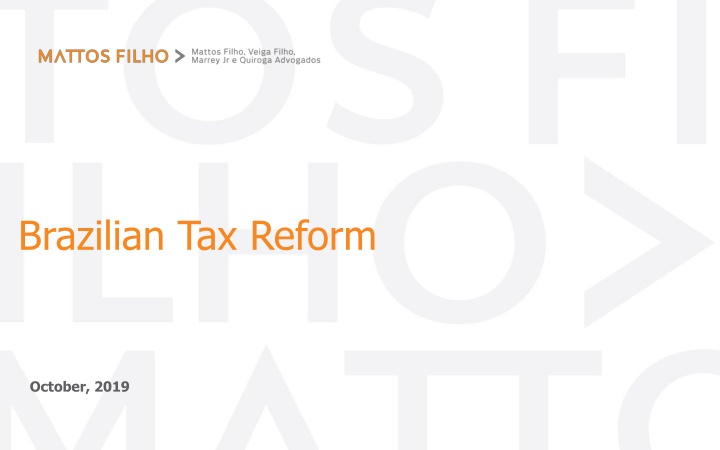


![Town of [Town Name] Real Estate Tax Rates and FY 2024 Budget Summary](/thumb/62211/town-of-town-name-real-estate-tax-rates-and-fy-2024-budget-summary.jpg)


